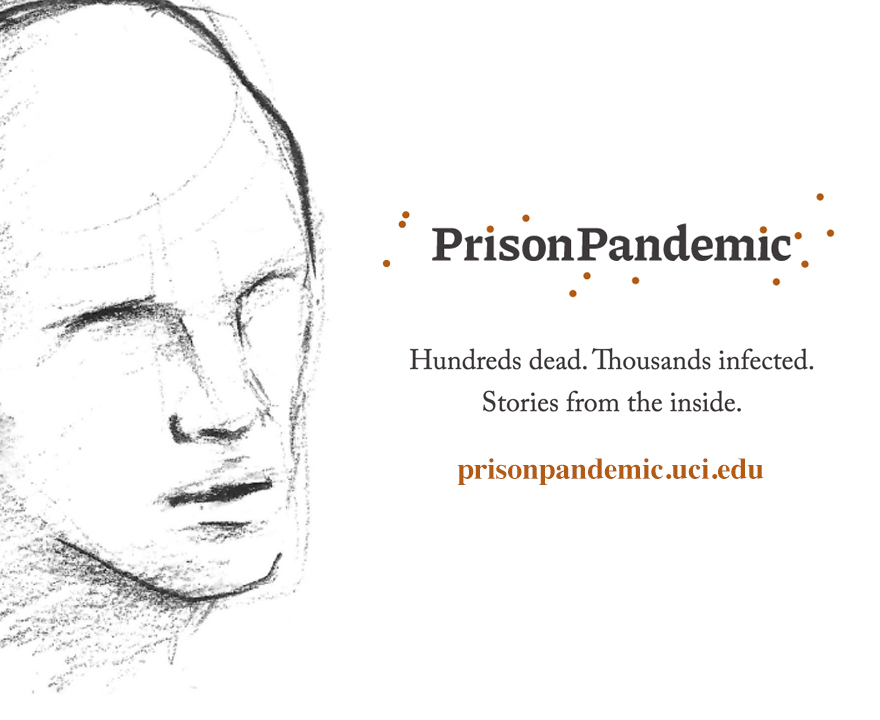The pandemic in prison

The pandemic in prison
- March 10, 2021
- New site shares personal stories of COVID conditions inside California’s state prisons in effort to raise awareness, action
-----
Limited access to cleaning supplies and protective face coverings. Months-long, 24-hour lockdowns with no family visits. Living quarters that make social distancing next to impossible. And a case rate that keeps climbing. The COVID conditions inside California’s prisons paint a stark reality of the mental and physical health toll the pandemic is taking on incarcerated individuals, says Kristin Turney, University of California, Irvine sociologist. She’s part of a group working to raise public awareness of the Coronavirus crisis in the state’s prisons through a new website, www.prisonpandemic.uci.edu.
“These personal stories highlight hardship in a profound way,” says Turney. “And what’s really poignant are the racial disparities in our country’s incarcerated population. People of color and those from low-income communities are overrepresented in prison, meaning that the plight of the pandemic in prison is being felt more heavily among an already marginalized population. By sharing their stories, we’re giving them a platform they may not otherwise have.”
Launched in March, the site features first-hand accounts of what the pandemic looks like in prison as told through letters and recorded phone calls collected via the project’s anonymous hotline. The work is a collaborative, donor-funded effort between Turney; UCI criminology, law & society associate professors Keramet Reiter and Naomi Sugie and graduate students Joanne DeCaro and Gabe Rosales; and other School of Social Ecology field study students, as well as student volunteers.
“Being incarcerated is itself a risk factor for chronic health problems and early mortality, yet those in prison face persistently inadequate access to medical care. We hope the accounts we collect will reveal how COVID-19 has magnified these problems, and be a resource for journalists and scholars alike seeking to understand and mitigate the health harms of incarceration,” says Reiter who has played a key role in creating the first in-prison B.A. completion program offered by the University of California system.
Statistics emphasized on the site track current COVID outbreaks in the state’s prisons alongside personal narratives to highlight the human element that is often missed in public perception and understanding of the experience of individuals who are incarcerated, says Sugie.
“We often think of prisons as closed institutions that do not affect us or our communities. But, in fact, our society’s health, safety, and well-being are closely tied to our prisons. The COVID crisis in prisons is revealing long-standing and entrenched problems with mass incarceration generally,” she says.
Joanne DeCaro, who has helped curate and transcribe the stories, hopes the project will help draw attention to the magnitude of mental and physical health concerns that are apparent in each of the shared narratives. “The stories we have collected so far overwhelmingly describe a sense of helplessness and fear,” she says. “Helplessness because they often have limited to no means to protect themselves, and a strong fear that they might never see their loved ones again.”
The group hopes to expand the project’s focus beyond COVID-19 narratives to continue raising awareness of health and racial disparities inside California’s prisons, and work toward effective solutions to the state’s overcrowded prisons.
For more information, visit www.prisonpandemic.uci.edu. To share a prison pandemic story, anonymous calls can be made to 949-824-6600 (Monday-Friday, 5 p.m. to 9 p.m.) and letters may be mailed to PO Box 4430, Sunland, CA 91041. The project is collecting calls from those currently incarcerated, recently incarcerated, loved ones of those incarcerated, and staff. The hotline accepts collect calls.
-Heather Ashbach, UCI Social Sciences
-----
Would you like to get more involved with the social sciences? Email us at communications@socsci.uci.edu to connect.
Share on:
Related News Items
- Careet RightCalifornia's prison death rates rose amid COVID
- Careet RightCOVID prison death rate increased 3 times higher than broader population: study
- Careet RightHow the US failed people in prisons during Covid: 'Really important to learn from what happened'
- Careet RightTransparent justice
- Careet RightLove behind bars


